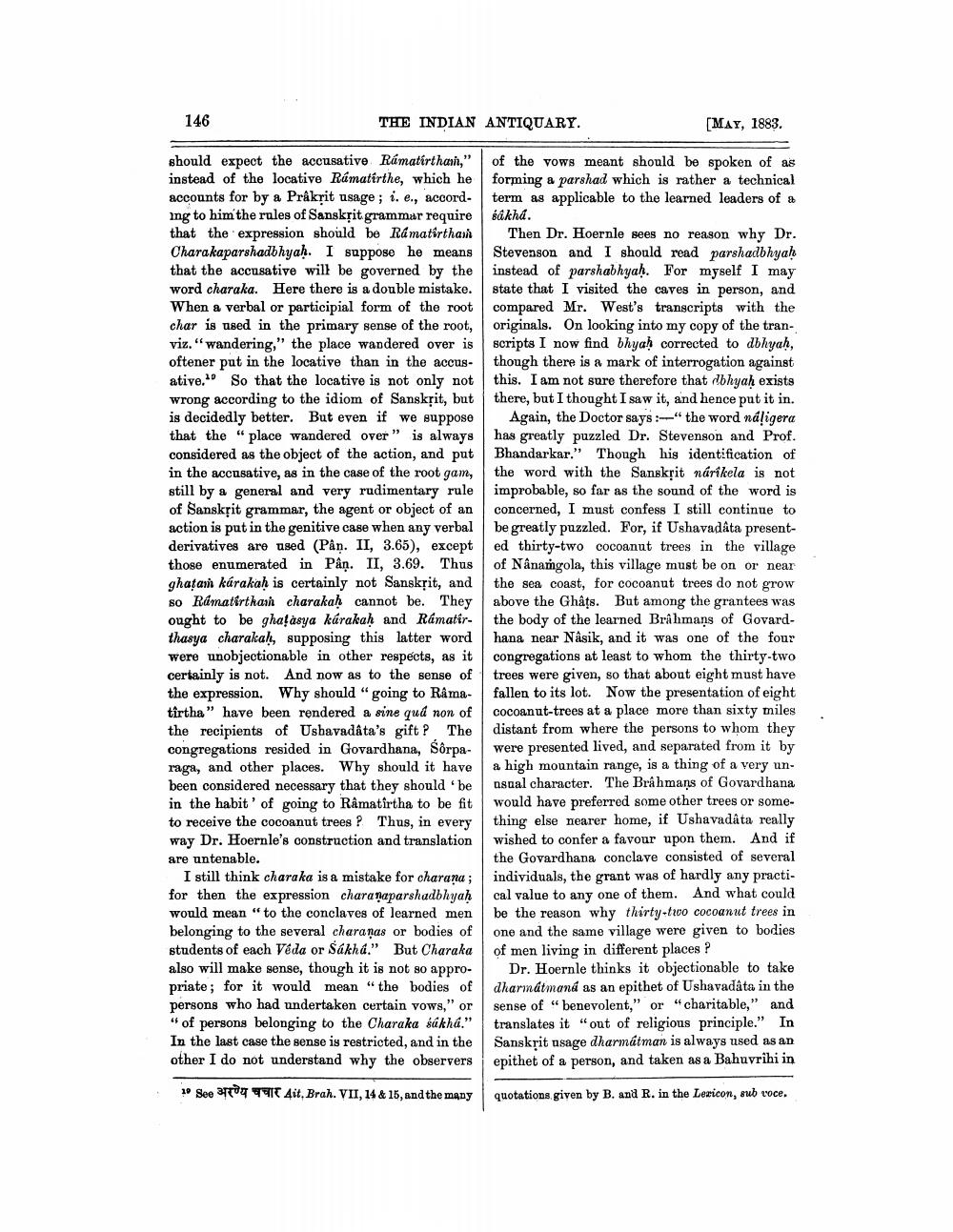________________
146
THE INDIAN ANTIQUARY.
[MAY, 1883.
should expect the accusative Rámatirthan," of the vows meant should be spoken of as instead of the locative Rámatérthe, which he forming a parshad which is rather a technical accounts for by a Prakrit usage; i. e., accord term as applicable to the learned leaders of a ing to him the rules of Sansksit grammar require sakha. that the expression should be Rámatirthan Then Dr. Hoernle sees no reason why Dr. Charakaparshadbhyah. I suppose he means Stevenson and I should read parshadbhyah that the accusative will be governed by the instead of parshabhyak. For myself I may word charaka. Here there is a double mistake. state that I visited the caves in person, and When a verbal or participial form of the root compared Mr. West's transcripts with the char is used in the primary sense of the root, originals. On looking into my copy of the tranviz."wandering," the place wandered over is scripts I now find bhyah corrected to dbhyah, oftener put in the locative than in the accus- though there is a mark of interrogation against ative. So that the locative is not only not this. I am not sure therefore that dbhyah exists wrong according to the idiom of Sanskrit, but there, but I thought I saw it, and hence put it in. is decidedly better. But even if we suppose Again, the Doctor says :-"the word naligera that the place wandered over" is always has greatly puzzled Dr. Stevenson and Prof. considered as the object of the action, and put Bhandarkar." Though his identification of in the accusative, as in the case of the root gam, the word with the Sanskrit nárikela is not still by a general and very rudimentary rule improbable, so far as the sound of the word is of Sanskrit grammar, the agent or object of an concerned, I must confess I still continue to action is put in the genitive case when any verbal be greatly puzzled. For, if Ushavadata presentderivatives are used (Pån. II, 3.65), except ed thirty-two cocoanut trees in the village those enumerated in Pân. II, 3.69. Thus of Nánarigola, this village must be on or near ghatan kárakah is certainly not Sanskrit, and the sea coast, for cocoanut trees do not grow so Rámatirthain charakah cannot be. They above the Ghâts. But among the grantees was ought to be ghatasya kárakah and Rámatir- the body of the learned Brahmans of Govardthasya charakah, supposing this latter word hana near Nâsik, and it was one of the four were unobjectionable in other respects, as it congregations at least to whom the thirty-two certainly is not. And now as to the sense of trees were given, so that about eight must have the expression. Why should "going to Rama- fallen to its lot. Now the presentation of eight tirtha" have been rendered a sine qud non of cocoanut-trees at a place more than sixty miles the recipients of Usbavadata's gift p The distant from where the persons to whom they congregations resided in Govardhana, Sörpa-| were presented lived, and separated from it by raga, and other places. Why should it have a high mountain range, is a thing of a very unbeen considered necessary that they should be nsual character. The Brahmans of Govardhana in the habit' of going to Ramatirtha to be fit would have preferred some other trees or someto receive the cocoanut trees? Thus, in every thing else nearer home, if Ushavadâta really way Dr. Hoernle's construction and translation wished to confer a favour upon them. And if are untenable.
the Govardhana conclave consisted of several I still think charaka is a mistake for charana; individuals, the grant was of hardly any practifor then the expression charanaparshadbhyah cal value to any one of them. And what could would mean "to the conclaves of learned men be the reason why thirty-trco cocoanut trees in belonging to the several charaņas or bodies of one and the same village were given to bodies students of each Véda or Sakha." But Charaka of men living in different places ? also will make sense, though it is not so appro- Dr. Hoernle thinks it objectionable to take priate; for it would mean "the bodies of dharmatmand as an epithet of Ushavadata in the persons who had undertaken certain vows," or sense of “benevolent," or "charitable," and " of persons belonging to the Charaka šákhá." | translates it "out of religious principle." In In the last case the sense is restricted, and in the Sanskrit usage dharmátman is always used as an other I do not understand why the observers epithet of a person, and taken as a Bahuvrihi in
?" See TT09TU 4it. Brah. VII, 14 & 15, and the many
quotations given by B. and R. in the Lexicon, sub voce.




